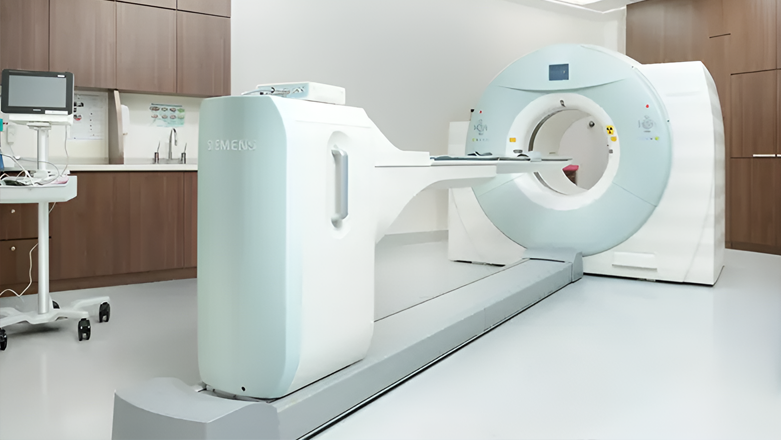Low-Dose Computed Tomography (LDCT) Scan
What is a low-dose CT scan?
A low-dose computed tomography (LDCT) scan is a specialised imaging test that employs significantly lower levels of radiation compared to standard CT scans.
It is primarily utilised for lung cancer screening, especially in individuals at high risk, such as long-term smokers.
The procedure is non-invasive, painless, and typically completed within a few minutes.
How it works
During an LDCT scan, the patient lies on a motorised table that slides through a circular opening of the CT scanner. The scanner rotates around the patient, capturing multiple cross-sectional images of the lungs. These images are then reconstructed by a computer to provide detailed visuals, enabling the detection of abnormalities like nodules or tumours.
Differences between LDCT and CT scan
- Purpose: While standard CT scans are often used for diagnostic purposes across various body regions, LDCT scans are specifically designed for screening, particularly for early detection of lung cancer in high-risk populations.
- Radiation exposure: LDCT scans use approximately one-fifth of the radiation dose of standard CT scans, reducing potential risks associated with radiation exposure.
- Image quality: Although LDCT scans use less radiation, advancements in technology ensure that the image quality remains sufficient for detecting early-stage lung abnormalities.
Why do you need a low-dose CT scan?
LDCT scans are primarily recommended for:
- Early detection of lung cancer: Detecting lung cancer at an early stage significantly improves treatment outcomes. LDCT scans can identify small nodules or tumours before symptoms arise.
- High-risk individuals: Those aged 55 – 74 years with a significant smoking history (e.g. 30 pack-years) and who currently smoke or have quit within the past 15 years are considered high-risk and may benefit from annual LDCT screening.
- Monitoring: Individuals with a history of lung disease or previous lung cancer may undergo LDCT scans to monitor for recurrence or progression.
While smoking is a known risk factor for lung cancer, non-smokers can also be affected and may benefit from low-dose CT screening.
LDCT has revolutionised lung cancer screening by enabling the detection of small pulmonary nodules, often before symptoms manifest. This early detection is crucial, as it allows for interventions at a stage when treatment is more likely to be successful.
Technological advancements have also enhanced the sensitivity and specificity of LDCT scans. Modern LDCT scanners can detect nodules as small as 3 – 5mm, which is significantly smaller than what standard chest X-rays can reveal. Moreover, LDCT uses approximately up to 80% less radiation than standard CT scans, making it safer for routine screening without compromising diagnostic accuracy.
Who should not undergo a low-dose CT scan?
LDCT scans are generally intended for high-risk individuals. You may also not need or benefit from the scan if:
You are already experiencing symptoms
LDCT is meant for asymptomatic screening. If you have symptoms like a persistent cough or unexplained weight loss, a standard diagnostic CT scan may be more appropriate.You are pregnant or may be pregnant
Radiation exposure, even at low doses, may pose risks to a developing baby.You have had a recent LDCT scan
Repeating imaging unnecessarily may expose you to additional radiation without added benefit.
What are the risks and complications of a low-dose CT scan?
While LDCT scans are generally safe, potential risks include:
False positives
LDCT scans may detect abnormalities that are not cancerous, which may require follow-up tests to confirm their nature.Radiation exposure
While the radiation dose is much lower than a standard CT scan, it is still a form of exposure. Screening is recommended only when the potential benefits outweigh the risks.Overdiagnosis
Some lung cancers grow very slowly and may not impact overall health. Screening helps identify them early, but further evaluation will help determine if treatment is needed.
While false positives are an inherent risk in LDCT scans, the benefits of early detection and reduced mortality rates significantly outweigh these concerns. Ongoing improvements in screening protocols and imaging technology continue to enhance the accuracy of LDCT, solidifying its role as the definitive test for early lung cancer detection.






